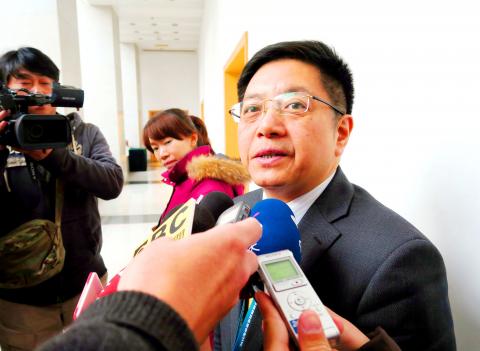The central government yesterday expressed its deep regret and discontent with the International Criminal Police Organization’s (Interpol) rejection of its bid to attend the organization’s upcoming general assembly.
Asked if Beijing was behind Interpol’s decision, Minister of Foreign Affairs David Lee (李大維) said “that is a very obvious factor.”
Presidential Office spokesman Alex Huang (黃重諺) last night urged China to acknowledge the Republic of China’s existence and stop hurting the well-being of Taiwanese by obstructing Taiwan’s participation in international organizations.

Photo: CNA
The government will continue to work closely with the US and other like-minded nations to promote Taiwan’s participation in Interpol, in the hope that Taiwan can be included in the global network for public security protection, the Ministry of Foreign Affairs said.
Taiwan was forced to withdraw from Interpol in 1984 when China joined the organization.
For the first time in 32 years, the government last month applied to participate as an observer at Interpol’s 85th general assembly, which runs from tomorrow to Friday in Bali, Indonesia.
Interpol president Mireille Ballestrazzi and secretary-general Jurgen Stock separately wrote to Criminal Investigation Bureau Commissioner Liu Po-liang (劉柏良) stating the organization’s decision to turn down Taiwan’s application, the ministry said.
The ministry said that Taiwan’s bid to participate in the assembly does not involve politics, but is intended to facilitate cooperation with the police forces of other nations and contribute to global efforts against organized crime, cybercrime, cross-border crime and terrorism.
With cross-border crime becoming a serious problem amid globalization, having no access to Interpol information is posing a challenge to Taiwan’s crime-fighting operations, the ministry said, urging Interpol to deal with Taiwan’s case positively and pragmatically based on the need to maintain global security.
Considering the need to maintain security during next year’s Universiade in Taipei, the ministry has also requested that Interpol allow Taiwan to access its I-24/7 global police communications system and the Stolen and Lost Travel Documents database.
Meanwhile, the ministry said it appreciated the US’ support for Taiwan’s participation in the assembly.
Both the US Senate and House of Representatives in March passed legislation requiring the US secretary of state to develop a strategy to obtain observer status for Taiwan in Interpol. The bill was then signed into law by US President Barack Obama.
Separately yesterday, the Mainland Affairs Council urged China to stop obstructing Taiwan’s efforts to particiate in international organizations.
Taiwan and China should treat each other in a friendly way and seek to resolve differences of opinion through bilateral dialogue in the interests and well-being of their people, the council said.
A survey conducted by the council last month revealed that 80 percent of Taiwanese believe Taiwan’s bids to take part in international organizations should not be subject to political interference, the council said, urging Beijing and the international community not to ignore public opinion in Taiwan.
Additional reporting by Su Fang-ho

GEARING UP: An invasion would be difficult and would strain China’s forces, but it has conducted large-scale training supporting an invasion scenario, the report said China increased its military pressure on Taiwan last year and took other steps in preparation for a potential invasion, an annual report published by the US Department of Defense on Wednesday showed. “Throughout 2023, Beijing continued to erode longstanding norms in and around Taiwan by employing a range of pressure tactics against Taiwan,” the report said, which is titled “Military and Security Developments Involving the People’s Republic of China (PRC) 2024.” The Chinese People’s Liberation Army (PLA) “is preparing for a contingency to unify Taiwan with the PRC by force, if perceived as necessary by Beijing, while simultaneously deterring, delaying or denying

PEACEFUL RESOLUTION: A statement issued following a meeting between Australia and Britain reiterated support for Taiwan and opposition to change in the Taiwan Strait Canada should support the peaceful resolution of Taiwan’s destiny according to the will of Taiwanese, Canadian lawmakers said in a resolution marking the second anniversary of that nation’s Indo-Pacific strategy on Monday. The Canadian House of Commons committee on Canada-Chinese relations made the comment as part of 34 recommendations for the new edition of the strategy, adding that Ottawa should back Taiwan’s meaningful participation in international organizations. Canada’s Indo-Pacific Strategy, first published in October 2022, emphasized that the region’s security, trade, human rights, democracy and environmental protection would play a crucial role in shaping Canada’s future. The strategy called for Canada to deepen

TECH CONFERENCE: Input from industry and academic experts can contribute to future policymaking across government agencies, President William Lai said Multifunctional service robots could be the next new area in which Taiwan could play a significant role, given its strengths in chip manufacturing and software design, Taiwan Semiconductor Manufacturing Co (TSMC, 台積電) chairman and chief executive C.C. Wei (魏哲家) said yesterday. “In the past two months, our customers shared a lot of their future plans with me. Artificial intelligence [AI] and AI applications were the most talked about subjects in our conversation,” Wei said in a speech at the National Science and Technology Conference in Taipei. TSMC, the world’s biggest contract chipmaker, counts Nvidia Corp, Advanced Micro Devices Inc, Apple Inc and

LEAP FORWARD: The new tanks are ‘decades more advanced than’ the army’s current fleet and would enable it to compete with China’s tanks, a source said A shipment of 38 US-made M1A2T Abrams tanks — part of a military procurement package from the US — arrived at the Port of Taipei early yesterday. The vehicles are the first batch of 108 tanks and other items that then-US president Donald Trump announced for Taiwan in 2019. The Ministry of National Defense at the time allocated NT$40.5 billion (US$1.25 billion) for the purchase. To accommodate the arrival of the tanks, the port suspended the use of all terminals and storage area machinery from 6pm last night until 7am this morning. The tanks are expected to be deployed at the army’s training